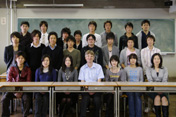Colin McKenzie, Professor, Faculty of Economics
Are seminar classes a place where teachers study?
In my seminar class, after reviewing the important principles of microeconomics, we study the basics of econometrics and how to use econometrics software. Twenty six third and fourth-year students study together to conduct applied analyses of the Japanese economy.

During their 2 years at Mita, my seminar students are required to write three papers concerning Japan and the Japanese economy. These are a Mita-sai paper for presentation at the Mita Festival (Mita-sai, third-year students), an individual paper (third-year students) and a graduation thesis (fourth-year students). The fall semester is mainly used for student presentation of their papers. Compared to students at Osaka University where I used to work. Keio students’ interests and views are diversified, so they wrote all kinds of papers. For example, a few years ago, there were papers entitled “How does the aging society with fewer children affect the choice of asset management of households?” and “Proposals for reform of religious corporations--- New ways to manage religious corporations”. The former was based on an econometric analysis, and the latter was, in a way, related to the student’s job, he was going to be a priest. When economists think about economic reform, we usually do not think about reform of religious corporations, but when I read this paper, I found many interesting points in this theme. However, from the standpoint of the teacher, it is a great challenge to provide guidance for papers in different fields and with styles that involve various methods of analysis.
When a student presents his/her ideas and summary of a paper for the first time, I often hear questions such as “What conclusion is it going to lead to?” Every time I hear this question, I feel something wrong, because in applied econometrics, you formulate a hypothesis, collect data, and after validating the hypothesis, you reach a conclusion. Therefore, unless you analyze the data, you do not know what results you will get, and, therefore, you do not know what your conclusions will be. This is the hardest part of writing an applied paper.
The theme of last year’s Mita-sai paper were: (1) How does road construction affect the number of tourists going to Okinawa?; (2) The competitiveness of restaurants based on an analysis of “Hotpepper”, and (3) What does the increase in cellular phone business depend on? I expected that road construction in Okinawa would not affect the number of tourists going to Okinawa, but the results of quantitative analysis were different. As for the second theme, I had never heard of even the name of the free magazine “Hotpepper” until I heard the first presentation of this paper. This made me realize that my life and the students’ lives are quite different. As for the third theme, every time I encounter a paper about cellular phone business, it makes me feel the limits of econometrics, which is my area of specialisation. I am not sure how much meaning my seminar class has for my students, but surprisingly, I learn a lot from it.
Faculty Profile
Prof. Colin McKenzie, Faculty of Economics
After graduating from the Faculty of Economics at the Australian National University in 1980, Prof. McKenzie obtained a Ph.D. at ANU in 1987. In 1989, he became Associate Professor of the Faculty of Economics at Osaka University, and from 1994, served as Associate Professor and, later on, as Professor at the Osaka School of International Public Policy (OSIPP), Osaka University. He has been Professor of the Faculty of Economics at Keio University since 2003.
Student's Voice
Mai Ishikawa, Third-year Student, Faculty of Economics
“Think” independently
In our seminar class, during the spring semester, we take turns to read and present chapters from a textbook to obtain knowledge of microeconomics and econometrics, and during the fall semester, we work on writing papers individually and in groups based on themes that interest us. We also present papers at the Mita-sai, and at a inter-seminar study camp in the summer holidays, where we deepen our exchange with students from other universities, so we can experience a lot of things.
The greatest appeal of this seminar class is that the autonomy of students is valued. Students choose the contents of their papers, textbooks and presentations, and we all work actively. For example, the themes of our papers are quite varied, such as regional economy, corporate strategy, and transportation, and we are each required to decide on a theme based on our own interests, to study that topic and to make a presentation. Colin gives us accurate suggestions and advices for us. From Colin, we learned the importance of studying in depth the essence and basis of things, rather than looking at them one-dimensionally. By the way, based on Professor McKenzie’s request, we call our teacher Colin, and we study in a cozy atmosphere.
Different students gather in our seminar class such as those who are the head of a sports club, those studying to become a public accountant, and those who have lived overseas, and I am inspired studying with them and also feel that I am growing day by day.
*Position titles, etc., are those at the time of publishing.
